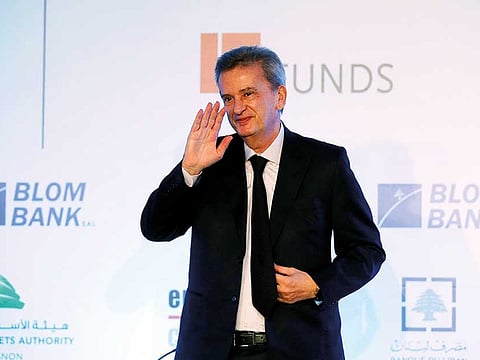Lebanon FX reserves fine for now, future intervention possible -c.bank head
Country’s central bank last year carried out what the IMF termed ‘unconventional’ financial engineering to boost falling foreign currency reserves

BEIRUT
Lebanon’s central bank governor said on Monday foreign currency reserves were stable and did not require immediate boosting via intervention, but it would take measures to maintain monetary stability if necessary.
The central bank last year carried out what the International Monetary Fund termed “unconventional” financial engineering to boost falling foreign currency reserves.
“Today we have a situation that is stable which doesn’t warrant any special operations,” governor Riad Salameh told Reuters on the sidelines of a Euromoney conference in Beirut.
“Depending on what would be necessary, we have various strategies we can implement, it is not essential that we go back to the same strategy we used in 2016.” Between June and August, the central bank exchanged some of its Lebanese pound-denominated debt holdings for dollar-denominated Finance Ministry Eurobonds, while private banks transferred in dollars and were given the Eurobonds and newly issued dollar certificates of deposit in exchange.
The central bank also bought pound-denominated bonds held on local banks’ books for the full principal amount plus interest up to maturity, instantly boosting their local currency reserves.
By mid-October reserves had risen to $41 billion (Dh151 billion) from around $35 billion before the financial operations. Since then they have declined again and on 30 April stood at $39.3 billion, according to the latest central bank figures.
Salameh said there was currently no need for “immediate special initiatives.”
Lebanon’s economy has for years been hindered by regional unrest, including the war in neighbouring Syria, and political crisis at home.
The IMF said its GDP increased by 1 per cent in 2015 and projected a similar rate for 2016, compared with a potential growth rate of 4 per cent.
Public debt stood at 138 per cent of GDP in 2015.
Salameh said the appointment of President Michel Aoun after a two-and-a-half-year period without a president, and the formation of a government with Sa’ad Hariri as prime minister late last year has created a basis for better growth, Salameh said.
But Lebanon is on the brink of crisis again with its politicians at odds over an election law at the heart of the nation’s sectarian system, threatening to leave the country without a parliament for the first time.
Parliament’s term expires on June 20 and without a compromise Lebanon faces what one minister has called the most serious political crisis since the end of its 1975-90 civil war.
Salameh said while the IMF was predicting growth of 2-3 per cent for 2017, the impact of the political situation was as yet unclear.
Salameh has steered the central bank for almost 24 years but his term of office expires in August. Banking figures have called for him to stay to send a message of stability to markets. He told Reuters the government has not yet decided if his term was to be extended.
Salameh also said the central bank does not plan to change rates.
“The central bank has a mandate from the government to keep stability for the Lebanese pound and there is a necessity to keep interest rates stable,” he told Reuters.
— Reuters
Sign up for the Daily Briefing
Get the latest news and updates straight to your inbox


